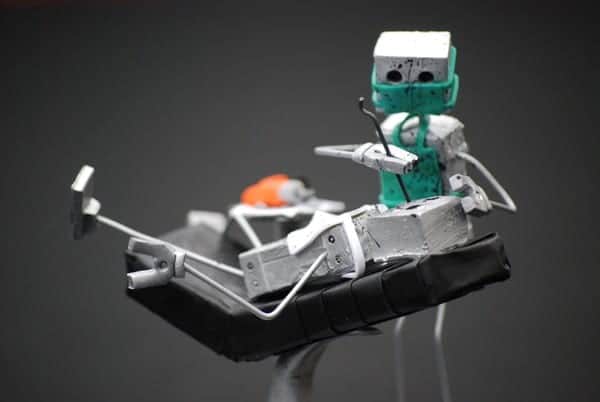
 Would you trust robot dentists? Robots are finding an increasing number of uses within the health care field, and now they’re set to boldly go where no autonomous bot has gone before: your mouth.
Would you trust robot dentists? Robots are finding an increasing number of uses within the health care field, and now they’re set to boldly go where no autonomous bot has gone before: your mouth.
The South China Morning Post reports that a robot dentist has successfully carried out its first implant surgery, ably fitting two new teeth in a woman’s mouth while human medical staff (hopefully including someone hovering over the off switch) looked on.
Robot Dentists are Hella Accurate…
“The implants were fitted to within a margin of error of 0.2-0.3mm, reaching the required standard for this kind of operation,” said experts to the Post.
The procedure involved a CT scan of the patient’s mouth to record data on the skull and jaw, after which the robot was manually put in position before the surgery. Reportedly, the robot was able to make the slight adjustments necessary to keep in line with the (awake and conscious) patient’s movements.
The whole procedure took approximately one hour, including the follow-up task of fitting in the dental base and crowns, made via 3D printing technology, which was carried out by human dentists.
“In recent years robots have increasingly been used to assist dentists with procedures such as root canal surgery and orthodontic operations as well as in training students,” reads the report.
Four years in the making, the robot was developed by the Fourth Military Medical University based in Xian and Beihang University in Beeijing in order to overcome difficulties both practical and demographic: the idea behind the dental robot is to rule out human error and make it easier to conduct surgery within the restrictive confines of the human mouth. But China also faces a massive shortage in dental surgeons, currently carrying out only one million implants across a country where there is a demand for about 400 million such procedures.
A growing middle class in China has come with more interest in the importance of oral hygiene, leading to higher demand for dental care delivery services.
“A lot of Chinese [dentists and dental students] want to travel abroad to learn,” says Robert Ord, chairman of the Department of Oral-Maxillofacial Surgery and professor at the University of Maryland School of Dentistry, to Dentist’s Money Digest. “The problem is that not all of them go back.”
Technology is playing a greater role in medical procedures in China, where corporate spending on innovation is twice that of companies in the United States. And, always a topic of discussion and potential trepidation, automation is a threat to employment in the health services, too.
Robot Dentists Filling in Gap in Dwindling Professional Interest…
While dentistry is often regarded as within a dwindling group of professions (physician and psychologist, for example) that are thought to be relatively safe from takeover by automation — at least in comparison to sectors such as manufacturing and mining — no field is fully immune, says Joshua Gans, chair in Technical Innovation and Entrepreneurship and professor of strategic management at the University of Toronto’s Rotman School of Management.
“Despite everybody understanding that there’s such a thing as disruption and Moore’s Law [of exponential computing growth] and exponential change, there’s still a tendency to disbelieve the rate of improvement in technology that can occur,” says Gans, to the Globe and Mail. “There’s still an underestimation of how quickly those barriers can fall, and all of a sudden you face very low-cost competitors and you don’t know where they came from.”
Leave a Reply
You must be logged in to post a comment.



 Share
Share Tweet
Tweet Share
Share




Comment